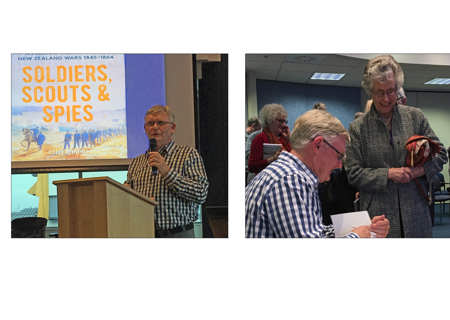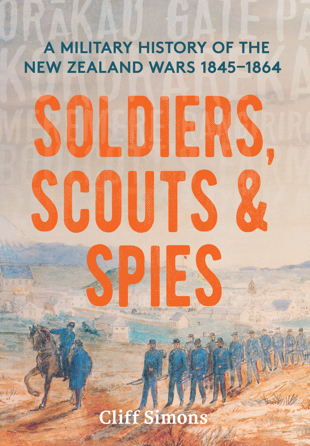Launch speech for Soldiers, Scouts & Spies, by Lieutenant Colonel Richard Taylor
E ngā mana, e ngā reo, e ngā hau e whā
Tēnā koutou tēnā koutou tēnā kotou katoa.
Ladies and gentlemen: good evening, and welcome to this very special occasion. I add my own words of welcome to Lieutenant Colonel Doctor Cliff Simons, his wife Paula, and the other speakers this evening.
I open by thanking Cliff for granting me the great honour of launching his latest book, Soldiers, Scouts and Spies, today. As many of you will know, Cliff and I are long-standing friends and comrades. We share much in common, perhaps the greatest of which is our interest in the New Zealand Wars, our desire to learn more about them, and the enjoyment we gain from sharing that learning with others. I do trust that I will justify the privilege.
You will recall that over the past several years New Zealand has commemorated the hundredth anniversary of our involvement in the Great War. That has been entirely appropriate, as that conflict played a major role in the development of our national identity. Over that same period, however, there has also been a resurgence in interest in the earlier series of conflicts that made up the New Zealand Wars. This resurgence gained momentum with the 2017 government decision to recognise 28 October as a commemorative day for the New Zealand Wars, and more recently with the decision that the New Zealand Wars, and New Zealand history generally, will feature more prominently in the school curriculum in future. This, too, is entirely appropriate: indeed, it is long overdue. In that sense, we should applaud Cliff for his prescience, and certainly his timing!
A very quick review of the historiography of the New Zealand Wars will help place this book into context. I believe that the historiography of these wars can be neatly divided into three distinct and sequential genres. The first of these included the accounts dating from the period from the Wars themselves through to the publication of Lindsay Buick’s New Zealand’s First War in 1926. These accounts share a number of characteristics: the idea of the heroic and noble savage versus a heroic yet magnanimous conqueror, a heavy reliance upon first-hand accounts (as many of the writers or speakers had fought on either side), and a predominantly narrative and non-analytical style.
They included a large number of veterans’ accounts, some of which were still appearing in local newspapers well into the twentieth century. Gradually, too, Māori accounts appeared, such as the Ngāti-Raukawa chief Hitiri te Paerata’s account of the battle of Orakau, given to the House of Representatives in 1888.
The historiography of this genre is most clearly articulated in the work of James Cowan, whose two-volume history of The New Zealand Wars, published in 1922, dominated the study of the Wars for more than half a century.
The next genre, which included such works as Edgar Holt’s The Strangest War, B.J. Dalton’s War and Politics in New Zealand, 1855-1870, Ian Wards’ The Shadow of the Land, and Tom Gibson’s The Maori Wars, relied heavily upon the works of Cowan and the earlier writers, although they were supplemented by greater use of official records. More importantly, they attempted to analyse as well as narrate. There were also attempts to analyse the impact of the Wars on Māori, such as Harold Miller’s The Invasion of Waikato and Race Relations In New Zealand. The result was an improvement in the historiography, although the continued reliance upon the traditional accounts – Cowan included – meant that many of the myths were perpetuated.
The third genre was built around James Belich’s The New Zealand Wars. Published in 1986, this work was a watershed in the study of the Wars, and clearly deserves to be regarded as seminal. Some commentators went so far as to suggest that it would be ‘impossible for anyone to write about the New Zealand Wars again without reference to its arguments’, and that its conclusions could never be seriously challenged.
Since then, however, James Belich’s conclusions have been challenged, and aspects of his thesis have been found wanting. This is an inevitable consequence of the study of history, and the work of the research historian.
Where, then, does the book we launch today sit in relation to this learning journey? I believe that we are entering a new era in the study of the New Zealand Wars; and that this book, Soldiers, Scouts & Spies, will eventually be seen as the watershed publication that marked the start of that era – just as Belich’s work did 35 years ago.
What makes this particular work so significant and special? I would like to offer a couple of observations in this regard.
My first observation is to note that this is the first history of the New Zealand Wars ever written by someone who is both a trained historian and a military professional. Without wanting to disparage what has gone before, the reality is that interpreting military events does require an understanding of the art and science of warfare. What may seem a foolish decision by one commander, or an act of desperation by another, may actually be neither when interpreted by someone who truly understands the context of those events, and the military issues that shaped them, and is able to interpret them for the reader.
My second observation is that, notwithstanding what I have just said, this book is so much more than a strict military history. Cliff has been able to trace the social, political and economic factors that provided the backdrop to the Wars, in a way that superbly supports his narrative, but without detracting from it. It is a more complete work than we have seen previously.
My third observation is how accessible this work is. The narrative is detailed without being overbearing; is wonderfully balanced in its treatment of all sides; and covers the subject matter in a flowing style. There is something here for the serious scholar, the college student, or someone who simply wants to know more about a series of events that have now burst into the national consciousness. It is a book that will be read and re-read, and will – I am very sure – be held in very high regard in the future.
Cliff: congratulations on completing such a superb piece of work. Today you have the great satisfaction of seeing the result of your labours. Enjoy the moment, and do take the time to reflect on this significant milestone.
May I also acknowledge Paula, and her support to Cliff throughout this journey. I know from personal experience how this type of commitment can impact on home and family life; and as such, how valuable a partner’s support is. Paula: thank you.
Ladies and gentlemen: it gives me great pleasure to launch Soldiers, Scouts and Spies: A military history of the New Zealand Wars, 1845–1864. I commend the book to you, and know that it will be a welcome addition to your collections.
No reira e te whānau, e hoa mā, rau rangatira mā, kia tau rangimārie ki a tātou katoa.
Thank you, and good evening.


